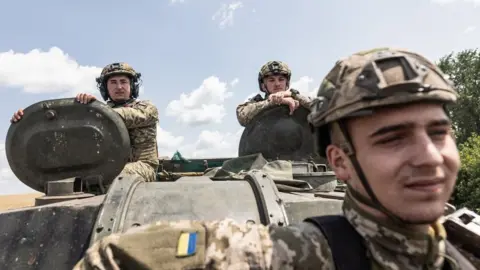Ben Wallace: Ukraine has 'tragically become a battle lab' for war technology
 Getty Images
Getty ImagesUkraine has "tragically become a battle lab", but lessons learned will inform the future of Britain's armed forces, Defence Secretary Ben Wallace has said.
His comments came before the release of a revised Defence Command Paper, first published before the war began.
Mr Wallace said that the effectiveness of weapons given to Kyiv by its allies had heavily influenced the revisions.
"We would be very foolish to ignore these lessons and not import them into our own armed forces," he said.
The revision of the paper, originally published in 2021, will set out how the UK will invest an additional £2.5bn of defence spending.
Mr Wallace, who plans to step down as defence secretary at the next cabinet reshuffle after four years in the job, said: "The war in Ukraine has focused minds because there is a very real adversary being very aggressive, breaking all the rules of war on the continent of Europe, fighting a war designed to destroy a country.
"That makes us realise we had better change the risk appetite we had when we did this paper originally.
"Originally we were taking things out of service, having a bit of a gap in the middle of the decade, and then we'd have the new equipment. That's something I don't want to risk any more."
The Ministry of Defence (MoD) said that the document highlighted key objectives for the UK's armed forces, including "prioritising investment in replenishment, modernising our forces and embodying a fully integrated approach to deterrence and defence".
"New technologies are not gimmicks, they're fundamentally key to how we fight a modern war," Mr Wallace said.
He added that analysing the strategies playing out in Ukraine would help "make sure that we can be match fit for any future conflict".
Drone defence and artillery
One such lesson is the "power of electronic warfare", Mr Wallace said, explaining: "The use of [electronic] warfare either to act as a decoy or to act as a defence is becoming really important, so it goes up the priority list."
He said that the war in Ukraine had also concentrated minds on the use of "deep fire" artillery, and had informed the decision to retire old 155mm guns and bring in new replacements.
"We have seen a generational shift in ranges of 'deep fire' artillery," he said. "The 155mm gun roughly had a 22-25km range for about 50 years.
"The new generation ... you're getting ranges of 60km in future. So I have taken a decision to phase out the old 155mm [for] the Swedish Archer 1."
Artillery has played a significant role for both sides in Ukraine. Britain's armed forces, however, have scaled down their artillery forces since the end of the Cold War.
Mr Wallace said: "At the end of the Second World War, 35% of the army was artillery. Now, it's roughly 8%. Deep fire is something we need to rebalance. These are the lessons."
'£24bn legacy'
The former soldier played a key role in the UK's response to the Russian invasion of Ukraine.
His Wyre and Preston North constituency in Lancashire will disappear at the next general election because of boundary changes and he has said he will not seek a new seat.
Speaking about the mark he hoped to leave on the MoD, Mr Wallace told the BBC that Prime Minister Rishi Sunak had given his department a "massive £24bn legacy".
"I've come in, and we've had a real term rise in our defence spending," he said.
He also warned that the conflict in Ukraine served as a reminder that "there are bad people out there wanting to do bad things to Britain and her allies".
Mr Wallace is believed to have told Mr Sunak last month of his plans to stand down from the cabinet.
Sources have told the BBC they expect the next reshuffle in September, but no date has been confirmed.
